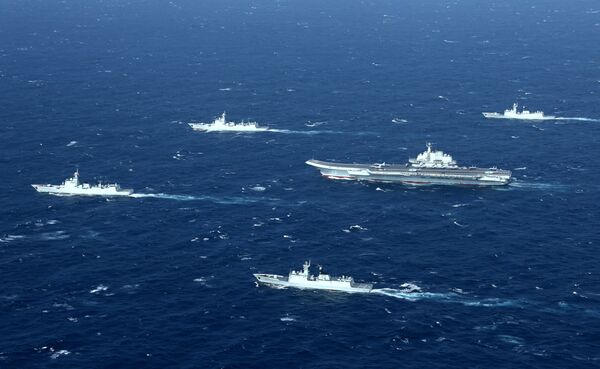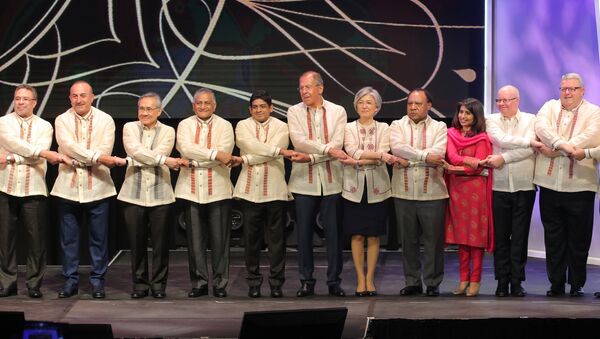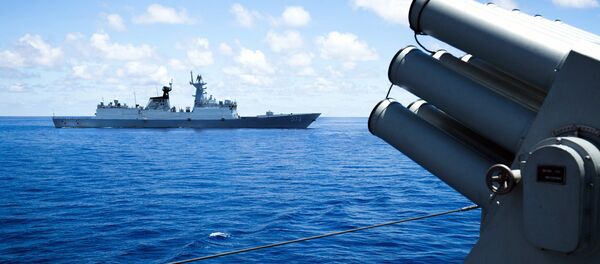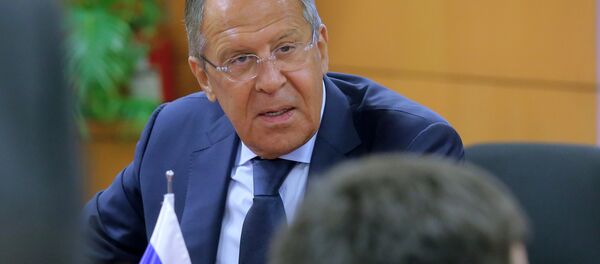According to Kosyrev, China continues to score political victories in the region.
The observer drew attention to the fact that earlier, the American diplomats had tried to convince Asian leaders to oust the North Korean minister from the list of the participants of the conference. However, Washington only received a polite refusal.
Then, the "decisive condemnation of Pyongyang" wasn't included in the communiqué, regardless of Washington's displeasure, because one country, Cambodia, China's close ally, blocked the issue, the journalist remarked adding that a separate statement on the Korean crisis was adopted later condemning North Korea, "but the statement was a document of a lower level."
"In Manila, China's Foreign Minister Wang Yi was the hero of the day, while his country was even called an 'honorary member of ASEAN'," Kosyrev continued.
"First, [Wang] condemned Pyongyang and recalled that China had earlier voted in the United Nations (UN) for new sanctions against the Democratic People's Republic of Korea (DPRK). Second, he called upon the North Koreans to 'be smart' and bring their [missile] tests to a halt," the journalist wrote.
"Third, Wang and his Russian counterpart Sergey Lavrov reminded the meeting of a joint initiative of Beijing and Moscow on a 'double freeze': [that means] that the DPRK stops any missile launches and nuclear tests, while the US and South Korea suspend large-scale military exercises [in the region]," Kosyrev emphasized.
For its part, Moscow has repeatedly signaled that a suitable solution to the Korean crisis could be found if all parties involved exercised a reasonable approach.
"We expect that through the reasonable approach of all actors, including the United States, South Korea, and Japan, we could find a decision that would satisfy all parties," Sergei Lavrov told reporters Tuesday.
While the "double freeze" concept appears to be the solution for the longstanding problem Washington is reluctant to accept it.
Citing Principal Deputy Assistant Secretary Susan Thornton the journalist noted that the "double freeze" proposal is "morally unacceptable" for Washington since it places the DPRK and the US on an equal footing.
"What is acceptable [in the eyes of Washington] is to isolate Pyongyang," Kosyrev remarked.
"One should remember that diplomacy issues could be solved only on an equal footing," the journalist stressed, "As a result, tensions continue to simmer in Asia, but the US is unlikely to win some sort of joyful support from ASEAN."

But that is not all.
One of the region's most burning issues has long been the territorial dispute in the South China Sea. However, it seems that the conflict has been downplayed.
"Previously the main implementers of the American policy of tension in the South China Sea were three countries: the Philippines, Singapore and Vietnam," Kosyrev noted.
"However, under its current President Rodrigo Duterte the Philippines has changed its position sharply… Seeing what's happening Singapore has also softened its stance, while other [countries of the region] have also become imbued with an understanding of the Chinese stance. Only Vietnam remained isolated. It was completely different a year or two ago," he pointed out.
There is yet another victory for the Chinese diplomacy: ASEAN nations and Beijing adopted the "framework" for further talks on the Code of Conduct in the South China Sea.
"The code is not about how to resolve territorial disputes involving at least four ASEAN countries and China, let alone Taiwan," Kosyrev stressed, "Such disputes are hardly ever resolved. The code is about how to behave today, while the disputes are not over — how to bring the scandal to an end and resume cooperation."
The decision to mull over the Code of Conduct opens the door to the peaceful resolution of the South China Sea issue. For its part, the US has nothing to offer except its support in a potential conflict in the region.
Meanwhile, China has become the second economic partner of ASEAN, and it's not the US which occupies the first position: the first place is given to the trade of ASEAN nations among themselves.
"Apparently, Washington has something to think about," Kosyrev remarked.
"The Manila [conference] has been a victory for Chinese diplomacy," the journalist emphasized, adding that the EU cannot boast the pluralism and the ability to reach compromises as the ASEAN format demonstrated.





